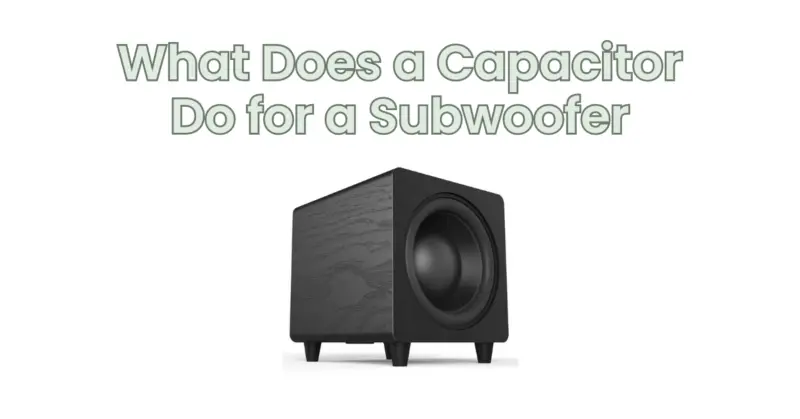A capacitor is an electronic component that plays a crucial role in subwoofer systems and audio setups. It serves as a key element in the overall performance and functionality of the subwoofer, particularly in managing power delivery. In this article, we will explore what a capacitor does for a subwoofer and why it is an important component in audio systems.
Understanding Capacitors: A capacitor is a passive electrical component that stores and releases electrical energy. It consists of two conductive plates separated by a dielectric material. When a voltage is applied across the plates, the capacitor stores electric charge, which can be released when needed.
Power Supply Stabilization: One primary function of a capacitor in a subwoofer is to stabilize the power supply. When the subwoofer demands high levels of power during dynamic bass passages, the capacitor acts as a reservoir, storing energy and releasing it rapidly to meet the subwoofer’s instantaneous power needs. This helps prevent voltage drops or fluctuations that could result in distortion or diminished performance.
Enhancing Bass Response: Capacitors also play a role in enhancing the bass response of a subwoofer. Low-frequency sounds, particularly deep bass notes, require a significant amount of power to be reproduced accurately. The subwoofer’s amplifier draws power from the electrical source, and capacitors help ensure that the amplifier receives a steady and adequate supply of power, especially during transient bass peaks. This allows the subwoofer to deliver deep, impactful bass with improved dynamics and control.
Filtering and Crossover: In some subwoofer systems, capacitors are used in conjunction with other components to create filters and crossovers. Filters help attenuate or block certain frequencies, allowing the subwoofer to focus on reproducing specific low-frequency ranges effectively. Capacitors can be used in combination with inductors and resistors to create low-pass filters that route only the desired bass frequencies to the subwoofer driver. This helps prevent distortion or damage caused by high-frequency signals reaching the subwoofer.
Protection against Voltage Spikes: Capacitors also provide protection against voltage spikes and surges. Electrical surges can occur in power supply lines due to various factors, such as lightning strikes or fluctuations in the power grid. Capacitors act as a buffer, absorbing excessive voltage spikes and providing a level of protection to the subwoofer and other connected components. This safeguards the subwoofer’s electronics and helps ensure its longevity and reliability.
Size and Capacitance: The size and capacitance value of the capacitor used in a subwoofer system can vary depending on the specific requirements and design considerations. Larger capacitors generally have a higher capacitance value and can store more energy, making them suitable for applications that demand higher power handling and bass performance.
Integration with Amplifiers and Power Supplies: Capacitors are typically integrated within the subwoofer’s amplifier circuitry or power supply circuitry. They are strategically placed to optimize power delivery and ensure stable performance throughout the subwoofer system.
In conclusion, capacitors play a significant role in subwoofer systems, contributing to power supply stabilization, enhancing bass response, filtering and crossover functions, and providing protection against voltage spikes. Their ability to store and release electrical energy allows them to meet the dynamic power demands of the subwoofer, ensuring smooth and accurate bass reproduction. Understanding the role of capacitors in subwoofers helps appreciate their importance in delivering a high-quality and impactful audio experience.


